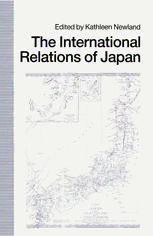
The International Relations of Japan PDF
Preview The International Relations of Japan
THE INTERNATIONAL RELATIONS OF JAPAN Also by Kathleen Newland THE SISTERHOOD OF MAN The International Relations of Japan Edited by Kathleen Newland Department of International Relations London School of Economics M MACMILLAN in association with Palgrave Macmillan © Millennium Publishing Group 1990 Softcover reprint of the hardcover 1st edition 1990 978-0-333-53456-4 All rights reserved. No reproduction, copy or transmission of this publication may be made without written permission. No paragraph of this publication may be reproduced, copied or transmitted save with written permission or in accordance with the provisions of the Copyright, Designs and Patents Act 1988, or under the terms of any licence permitting limited copying issued by the Copyright Licensing Agency, 33--4 Alfred Place, London WClE 7DP. Any person who does any unauthorised act in relation to this publication may be liable to criminal prosecution and civil claims for damages. First published 1990 Published by MACMILLAN ACADEMIC AND PROFESSIONAL LTD Houndmills, Basingstoke, Hampshire RG21 2XS and London Companies and representatives throughout the world Typeset by Latimer Trend & Company Ltd Plymouth British Library Cataloguing in Publication Data International relations of Japan. l. Japan. Foreign relations. Policies of government I. Newland, Kathleen 327.52 ISBN 978-0-333-53457-1 ISBN 978-1-349-21016-9 (eBook) DOI 10.1007/978-1-349-21016-9 To Caroline Martin whose knowledge of Japan grew with mine and will soon surpass it v Contents Notes on the Contributors x Acknowledgements xi 1 lntn)ducdon 1 Kathleen Newland l Where Does Japan Fit In? S Robert Gilpin The Japanese Challenge 6 The Lessons of the Past 9 Japan's Economic Strategy 15 Conclusion 21 3 Money and Inftuence: Japanese Power in the International Monetary and Fmancial System l3 Eric Helleiner Japan as Creditor to the World 23 State Control of External Assets 27 Importance of the Intemationalisation Process 33 Implications for Japanese Power: Structural Power 36 Conclusion 38 4 The Japanese Industrial Presence in America: Same Bed, Different Dreams 4S Michael Hodges Japanese Investment in the United States: Emollient or Irritant? 46 Japan's FDI in Perspective 49 The Changing Nature of Japanese FDI in the United States 53 US Policy toward Inward Investment: A Case of Benign Neglect 54 Competition between the States for Japanese Investment 60 Anti-Trust as Industrial Policy 64 Trojan Horse or Scapegoat? The Future of Japanese FDI in the United States 65 vii viii Contents s The lbird World in Japanese Foreign Policy 71 William Nester Japan's Foreign Policy and the Third World 71 Japan's Political and Economic Ties with the Third World 75 Bilateral and Multilateral Relations 78 Conclusion 96 6 Japan's Aid Diplomacy: Economic, Political or Strategic? 100 Juichi Inada Japan's Aid: Becoming More Political? 103 Aid Policy Making: The Facts behind Political Input 109 Commercial Interests: Myth or Reality? 113 Conclusion 117 7 Political and Economic Influences in Japan's Relations with China since 1978 121 Walter Arnold Hirschman's Trade and Investment Influence Effect Theory 122 Political and Economic Characteristics of Sino-Japanese Relations 124 The Influence Effect in Sino-Japanese Relations 126 Political Determinants of Sino-Japanese Economic Relations 132 Political and Economic Conflict 133 Crisis Management through Political and Economic Accommodation 138 Conclusion 140 8 Japan's Security Policy after US Hegemony 147 Tsuneo Akaha The Decline of US Hegemony 147 Japan's Perceptions of US Power 149 US Military Presence and Security Commitments in the Asia-Pacific Region 155 Perceptions of Security Threats to Japan 156 Broadening US-Japan Security Co-operation and Burden Sharing 158 Contents ix Troubling Defence-Trade Linkages 164 Conclusion 165 9 Stuck in a Mould: The Relationship between Japan and the Soviet Union 174 Wolf Mend/ The Legacy of History 174 Issues in the Post-1945 Relationship 178 The Gorbachev Phenomenon 194 Conclusion 195 10 Four Japanese Scenarios for the Future 206 Takashi Inoguchi Japan's External Role: Opinion Poll Results 208 Four Scenarios 210 Requirements for the Four Scenarios 217 The Four Scenarios Reconsidered 219 Conclusion 222 Index 227 Notes on the Contributors Tsuneo Akaha is Associate Professor of International Policy Studies at the Monterey Institute of International Studies, Monterey, California. Walter Arnold is Associate Professor of Political Science at Miami University, Oxford, Ohio. Robert Gilpin is Professor of International Affairs at the Woodrow Wilson School of Public and International Affairs, Princeton Univer sity, Princeton, New Jersey. Eric Helleiner is a doctoral candidate in International Relations at the London School of Economics. Michael Hodges is Senior Lecturer in International Relations at the London School of Economics. Juichi Inada is a Research Fellow at the Japan Institute oflnternational Affairs, Tokyo. Takashi lnoguchi is Professor of Political Science in the Institute of Oriental Culture, University of Tokyo. Wolf Mendl is Reader in the Department of War Studies, King's College, University of London. William Nester is Assistant Professor in the Department of Govern ment and Politics, StJohn's University, Jamaica, New York. Kathleen Newland is a lecturer in International Relations, London School of Economics. X
